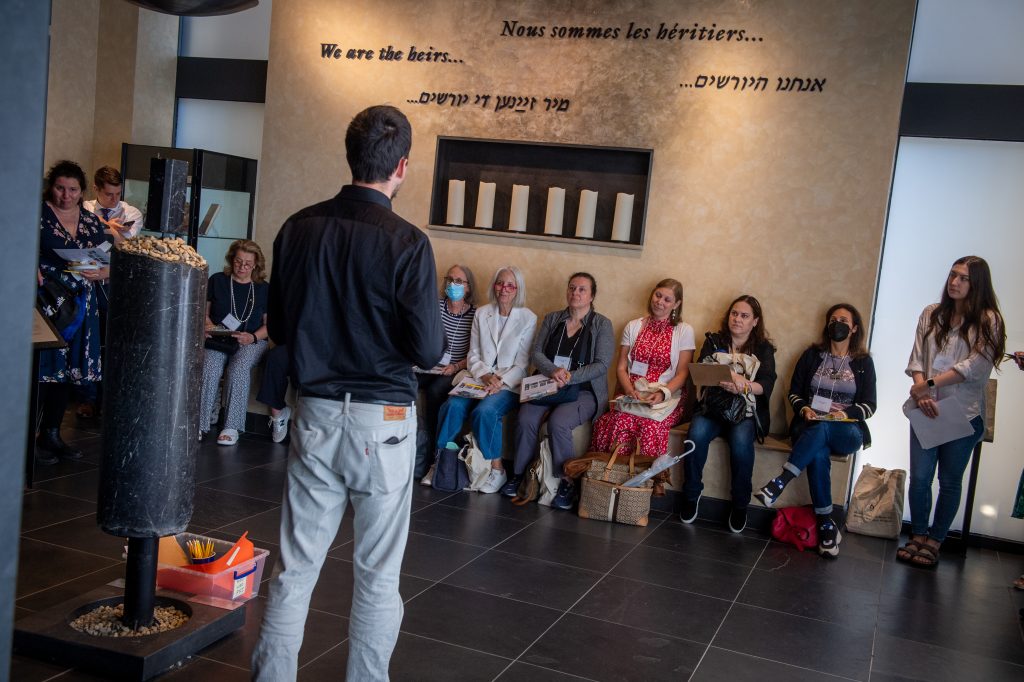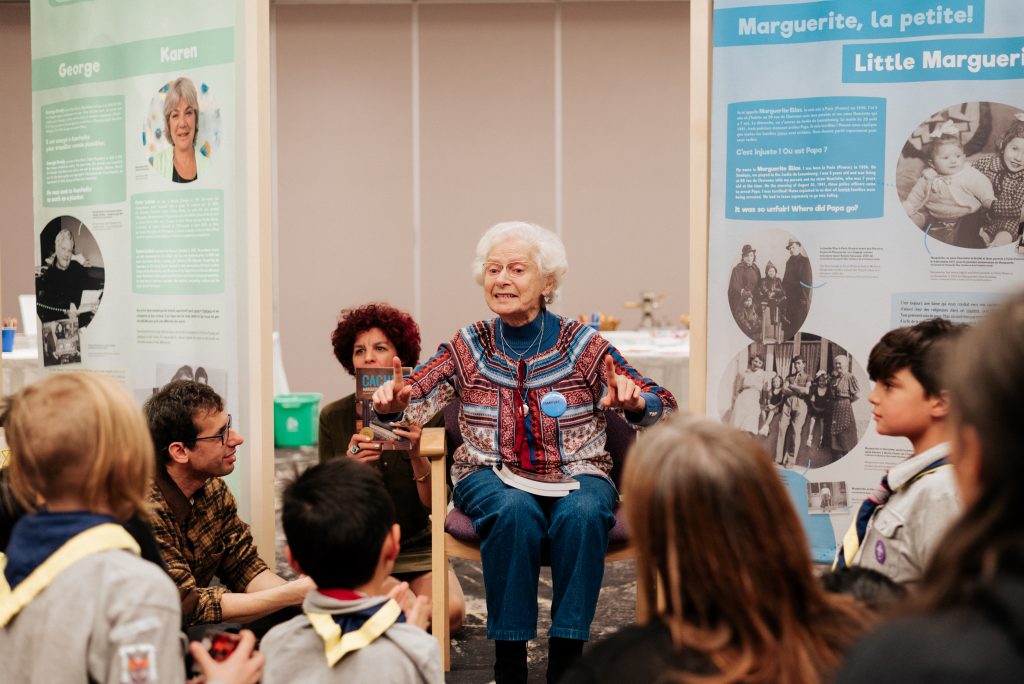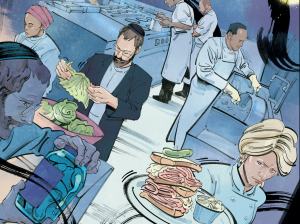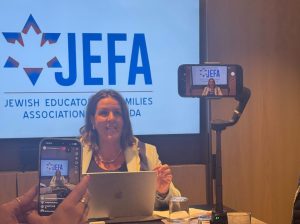For many Quebec students, the Holocaust is a remote concept, one which is barely connected to their lives or worldviews.
That’s problematic, says Marcy Bruck, communications director of the Montreal-based Foundation for Genocide Education. In some schools she says, “they might just read Anne Frank and that’s it,” even though “Grade 6 is an excellent entry point” for more profound learning.
Ontario announced last year it would make Holocaust education mandatory starting in Grade 6, expanding it in Grade 10 history next fall to link the Holocaust to extremism and antisemitism, with additional teacher training. In November 2023, Alberta also made Holocaust education mandatory in social studies, following British Columbia’s announcement to include it in the K-12 curriculum next school year.
In Quebec, the Foundation for Genocide Education and others continue to lobby for greater space in the curriculum. “Our position is clear,” said foundation president Heidi Berger. “We believe strongly that this education is more important than ever, in light of the alarming rise in antisemitism in Canada since the Oct. 7 attack by Hamas on Israeli civilians, and that it must be made a mandatory part of the school curriculum. Learning this history develops critical thinking and empathy and promotes respect for diversity.”
Last year, the foundation surveyed 200 Canadian secondary social science and history teachers, and found that 72 percent believe there is greater urgency for it, “yet only 50 percent said their students are knowledgeable on the subject,” added Berger, “and more worrying, only 46 percent of teachers in Quebec said education on the Holocaust and other genocides is currently included in their school’s curriculum.”
Quebec City’s assertion is that it is addressed in existing courses. Ministry spokesperson Esther Chouinard told The CJN “the concept of genocide” is studied in three high school social sciences programs. “First, the concept is integrated into the History and Citizenship Education program in the first cycle (grades 7 and 8),” specifically with content such as ‘Auschwitz’ or the ‘Nuremberg Laws’, then in the 20th Century History program in Cycle 2 (grades 10 and 11) in the theme of crises and conflicts. Genocides are also studied in the Contemporary World program she says, which aims “to lead students to grasp the complexity of today’s world and open up to the diversity of societies that make it up by studying different problems and issues of the contemporary world, including tensions and conflicts.”
The call for mandatory Holocaust education is growing, as school boards and educators find ways to incorporate it into existing curricula. At the English Montreal School Board, Quebec’s largest board, age-appropriate materials have been taught for years, using visits to the Montreal Holocaust Museum (MHM), speakers, and lessons integrated into Language Arts, History, and Art. On Oct. 3, 2023, the board formally asked the education ministry to make it mandatory, EMSB chair Joe Ortona telling The CJN a year later “if they don’t do it, we will.”
Last month, Federation CJA gave a $50,000 grant to the EMSB to continue and bolster its Holocaust education program. “Given the climate of antisemitism in the world and Montreal at this time,” stated Federation CJA president Yair Szlak in a release, “we believe this is an opportune moment to ensure that high school students, in particular, are properly educated about what happened in the Holocaust and the roots of antisemitism.”
Montreal lawyer Hélène Poussard's ignorant statements show why Holocaust education is needed.
— CIJA (@CIJAinfo) July 12, 2022
CIJA is calling on the government of Quebec to include #Holocaust and #antisemitism awareness in its educational curriculum. https://t.co/e3oVn4baIX@FederationCJA
The board’s main focus is on the museum, spokesperson Mike Cohen told The CJN. “But it is left up to us to use the funds in the best way. Between buses, admission and speaker, each visit to the museum is expensive but invaluable. We also bring speakers to schools, run a special website and have a podcast.”
Studying the Holocaust is more urgent today, says Ortona. “These initiatives have been ongoing but became more consistent and continuous since last year, with the explosion of antisemitism across the world and particularly in Canada and Montreal.
“I have heard from many students and staff who visited the museum and spoke to survivors. Most are not Jewish and have not been exposed to this subject. It had a tremendous impact, and I know this will follow them after their high school days are behind them.”
The Montreal Holocaust Museum is actively training educators, offering workshops, visits and tailored teaching guides and resources for each province’s curriculum. “Imagine if this was taught incorrectly, or teachers didn’t understand the really complex history,” says spokesperson Sarah Fogg. “That is why our work has been rooted in teacher training… Obviously we would welcome it being mandated in the province, but it is also really important to mandate teacher training.”
The MHM is seeing increased engagement and interest from educators to work with the museum and others to bring lessons and knowledge to students. Nearly 2,500 teachers from French, English, private and public sectors have participated in 50 museum workshops and conferences over the last five years.

The government she says, should turn to experts, “to get these teachers the training they need alongside organizations like ours who have pedagogical expertise, resources, tools and collections. That is crucial.” The museum’s move next year to the newly constructed, much larger space on Saint-Laurent Boulevard in the heart of the city will allow more such activities.
United Against Hate Canada (UAHC) director Marvin Rotrand began lobbying provinces when he was national director of B’nai Brith’s League for Human Rights and says, “Ontario is the gold standard.” Rotrand wrote to all 125 Quebec MNAs, urging them to follow Ontario’s lead. Despite other provinces’ moves he told The CJN, “We have made no progress in Quebec” he says, “where it remains possible for students to graduate with no Holocaust education… Quebec has among the weakest Holocaust education curriculum in the country.”
“Making Holocaust education mandatory reduces hate incidents targeting other racial and religious minorities,” he says. “Research clearly shows that in U.S. states with mandated Holocaust education, antisemitic crimes dropped by 55 percent. Crimes against Black, LGBTQ2+, Latino and Muslim communities also fell.”
Thank you Councillor @SonnyMtl for your leadership supporting @bnaibrithcanada request to #Quebec to follow #Ontarion and introduce mandatory #Holocaust education in primary school: Moroz moves motion calling for compulsory Holocaust education https://t.co/2xgIJBj0qO #cdnpoli
— Marvin Rotrand (@MarvinRotrand) October 2, 2023
Exactly, says Fogg, pointing to the Reality Check 2023 study looking at the effect of Holocaust education on youth.
Among key findings of the survey of 1,500 American post-secondary students, was that those receiving Holocaust education in high school were significantly more likely to be tolerant of others with different beliefs; open to having their own views challenged; able to discuss and negotiate controversial issues; and were more comfortable with people of a different race or sexual orientation. Not only were they more likely to report more tolerant and pluralistic attitudes and challenge incorrect or biased information, they were less likely to be a bystander to online harassment.
Sandra Banon doesn’t need statistics, just some good books. The EMSB French teacher has taught Holocaust lessons for more than a decade to Grade 6 students, often buttressed with museum visits. “As long as classes are prepared, then tour guides make it a more interactive, meaningful experience.” That means talking about pre-war discrimination and stigmatization of Jews wherever it happened. “Showing a yellow star on a smart board is one thing, but after a proper lesson and they see one on display at the museum, they immediately understand its origin and the context, so the impact is more significant.”
She uses stories and activities in French and art classes based on the book Hana’s Suitcase and was awarded a scholarship to learn more at Yad Vashem in Israel. “It’s absolutely worth the effort,” insists Banon, who met students years later who thanked her for introducing them to this part of history. “They were more aware in secondary when they were introduced to other, more horrific aspects of the story, and more prepared to go deeper and be more open-minded.”

EMSB commissioner Julien Feldman says young people need tools “to confront irrational sentiments they encounter at school and online everyday, especially antisemitism, racism and discrimination. We see Holocaust distortion running rampant online, especially among adults who are vulnerable to propaganda and conspiracy theories – because they have no grounding in authentic history.”
In Quebec schools overall, there is only sporadic mention of the Holocaust and genocide adds Berger, “to illustrate other concepts such as tensions and conflicts, justice and civil rights, while school boards such as the EMSB have committed themselves to taking on this education, as well as dedicated individual teachers.”
What’s needed says Bruck, is a separate course, “or separate components of existing courses, a day dedicated to Holocaust studies. Make it mandatory as part of the course where they discussed the Holocaust in and of itself.” Feldman agrees, saying students also need to hear and understand Canada’s part, including “our policy of sealing our borders to refugees during the Nazi era.”
The Foundation for Genocide Education, whose interactive Studying Genocide guide is available in French and English to every Quebec high school reaching over 300,000 students, met with Education Minister Bernard Drainville last spring to push for mandatory Holocaust education.
A warm reception notwithstanding, the official position is that it’s already taught in some way. “They haven’t closed the door” says Bruck. “I don’t know if they’ll make it mandatory, but there’s definitely effort to make it more prominent in the existing curriculum… We continue to dialogue with them.”
'Shocking to see': Video shows Quebec students giving Nazi salute during class https://t.co/9t11me4p7f
— CTV Montreal (@CTVMontreal) May 24, 2023
Shortly after the June 2023 case involving a group of Grade 7 students recorded performing Nazi salutes and playing Nazi military music in a Quebec classroom, Rotrand urged Drainville to act, as students’ obliviousness to the impact of their gestures illustrated why starting in Grade 6 is a good idea. That same month, the minister’s office told French-language news it would not follow Ontario’s lead.
Drainville and his ministry are currently mired in numerous challenges with school infrastructure, teacher shortages, and secularism issues, particularly following reports of religious interference in Montreal-area schools, mainly within the Centre de services scolaire de Montréal (CSSDM), Quebec’s largest French board.
Bruck says it would serve Quebec well to make Holocaust and genocide education part of its Culture and Citizenship program. “It will show how open society is, especially in terms of what’s been going on in Quebec of late, and the explosion in antisemitism in Montreal.”
At the Lester B. Pearson School Board, the island’s second-largest school board serving the western part of greater Montreal, the Holocaust is taught within the context of the Quebec Education Program, spokesperson Darren Becker told The CJN. “It would be covered in Grades 8 and 11 history,” adding, “several of our high school teachers recently attended a workshop hosted at the Holocaust Museum in Montreal to provide them with curricular resources.”
Asked what Holocaust material is taught in any of their 185 schools, CSSDM spokesperson Alain Perron told The CJN, “the Centre de services scolaire de Montréal applies the educational program of the Quebec Ministry of Education. Have a nice day.”
Author

Joel has spent his entire adult life scribbling. For two decades, he freelanced for more than a dozen North American and European trade publications, writing on home decor, HR, agriculture, defense technologies and more. Having lived at 14 addresses in and around Greater Montreal, for 17 years he worked as reporter for a local community newspaper, covering the education, political and municipal beats in seven cities and boroughs. He loves to bike, swim, watch NBA and kvetch about politics.
View all posts








